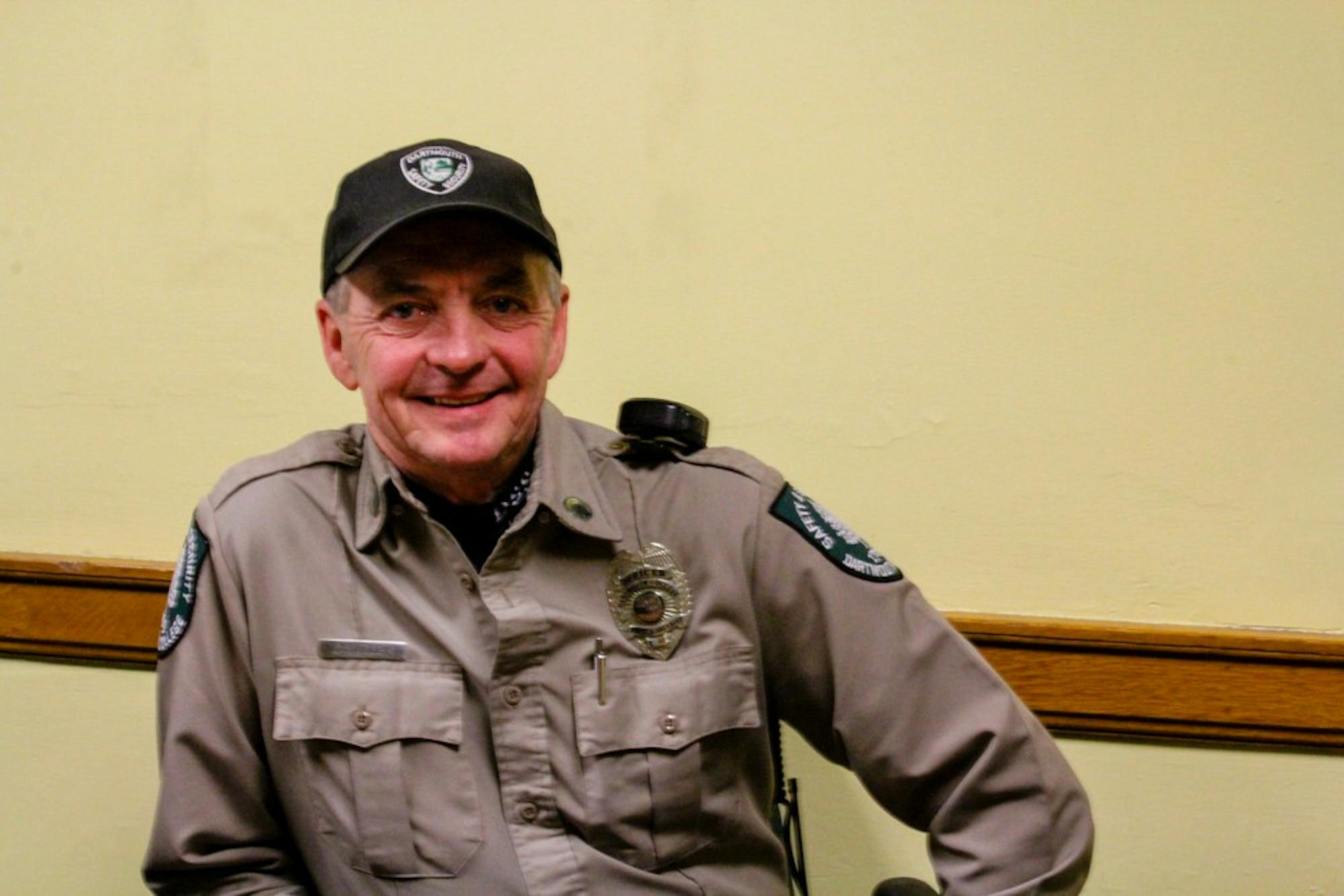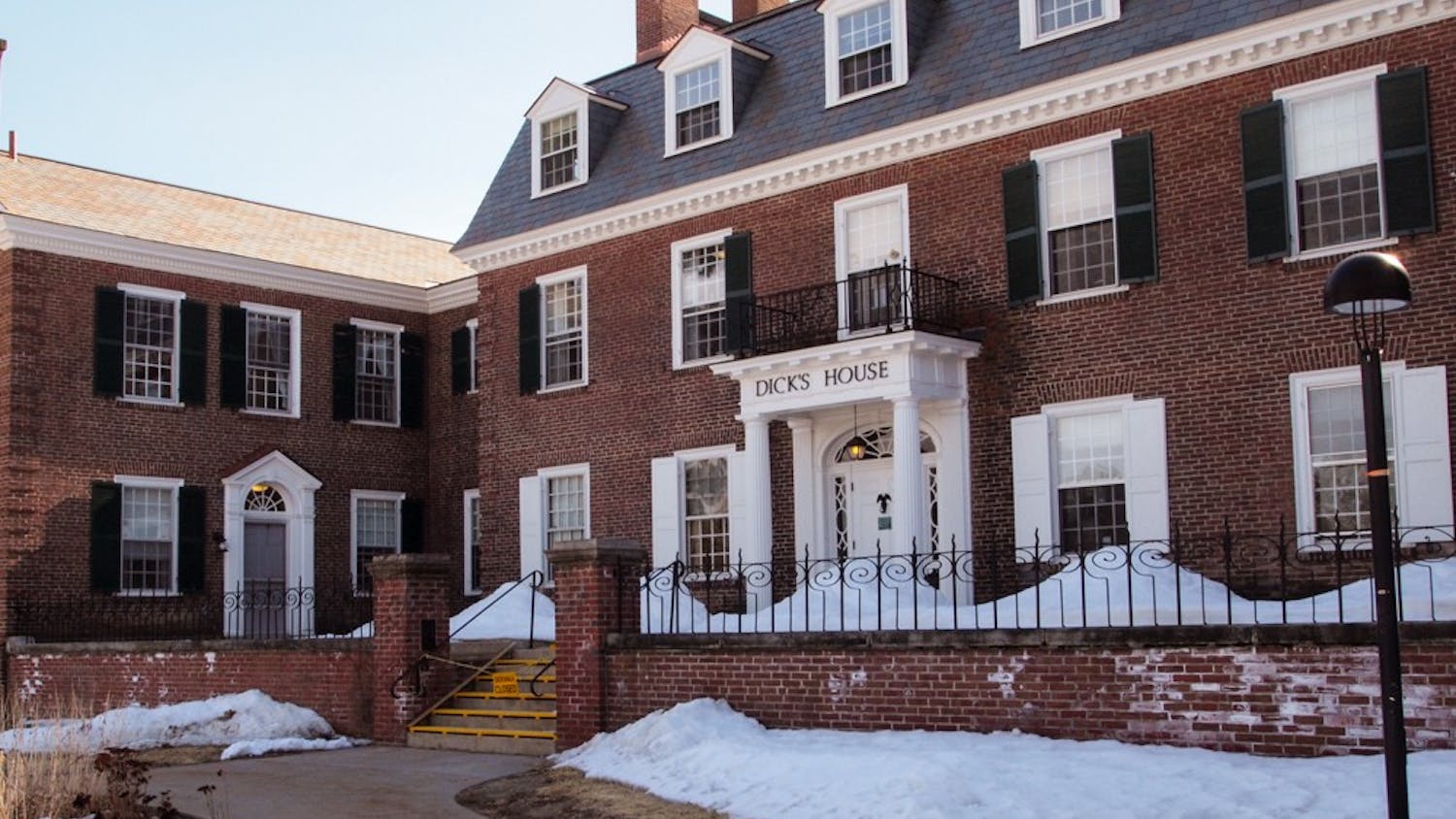This article is featured in the 2020 Winter Carnival special issue.
Safety and Security Officer Teddy Willey has kept a close eye on campus from his cruiser, and when the weather permits, his bicycle, for over 20 years. The Dartmouth went on a ride-along for an hour as Willey started his night-shift rounds, providing a look into the daily effort Safety and Security officers make to ensure Dartmouth students’ well-being.
During the ride-along, Willey drove by nearly every spot on Dartmouth’s campus — stretching from the rowing tanks by the bank of the Connecticut River to the sports fields behind Leverone Fieldhouse — surveying his surroundings for anything out of place.
In between responding to multiple calls and an injured student transport, Willey discussed his West Virginia background, his life as a Safety and Security officer and how he connects to the wider community.
Tell me about a typical night shift.
TW: We start our shifts with a briefing. At 4 p.m., our sergeant will recap the events which have happened since we were last here. Then, we go out and check our cruisers. We do an equipment check to see we have our AED, jump pack and other emergency equipment. Then, it’s patrol — scanning, keeping an eye out.
How often do calls come in?
TW: Night shift is not as busy as the day shift, but the severity of the calls are typically much worse. The typical day would be three to five reports, and the typical night is four to eight. The main job is to be a presence on campus and observe. Probably every other day, I’ll see something where I will say, “Hmm, that shouldn’t be there.”
How have the concerns of Safety and Security changed since 20 years ago?
TW: Our concerns are always the same in terms of keeping students safe and protecting them from themselves. But, we have to be extra cognizant of bias. We are more careful about protecting different students’ rights. We are more sensitive. It’s different today. Any concern, we will look into, no matter how trivial.
Have you had experiences where trivial concerns became larger concerns?
TW: What I may feel like is not a big deal, the student may feel is a very big deal. For instance: a fraternity tradition that has been going on for 100 years. We may find it harmless, but someone may find it super, super offensive. We treat all concerns as legitimate until they are investigated.
We are passing a blue light — do you ever respond to blue light button pushes?
TW: It used to be really common, but that was back before cell phones were really popular. Now, it’s like once a month. You can even use it to call for an unlock; we wouldn’t care. We have around 70 of them on campus, so we would respond immediately.
How did you end up in security work, and at Dartmouth?
TW: My father was a small town police chief in Hinton, WV. I always felt like that was something I wanted to do. But instead, I got married real young and went right into the coal mines. I was an underground coal miner for 20 years. The mines went kerplooey, just all at once. I went back to school and started teaching computer classes for adult education. I moved up here 23 years ago and I just love it up here. When I came here, I heard about this position from a friend and I applied.
Are there other skills you brought from your mining experience to Dartmouth?
TW: Not really, other than people skills. Because I was a supervisor in the mines, I felt I could do this type of work, because I managed people. That was a different world, I’m telling you.
Tell me about how you interact with the Dartmouth community and why it is important.
TW: When I say community, it means our neighbors as well. Let’s say I see a dog running loose. Is it from Theta Delt or from the lady who lives on Occum Ridge? It would be normal for me to knock on her door and say, “Hey, is Fluffy missing?” In terms of community on campus, you really need to know a lot of people. There is an incident. Do we call risk management? Is it at dining? Is it at the grounds garage? We need to know who to notify when something happens. The more people you know in the community, the better off you are.
Do you meet and talk to students on a regular basis?
TW: In student transports, it is constant talking. In the summers, when I am on a bicycle, it is heaven. You are actually saying, “Good morning,” stopping and helping. I know a lot of students, and I know a lot of staff.
Can you describe the best things about the job?
TW: The satisfaction from when you’ve helped people, and even when it’s in an uncomfortable situation. Let’s say it’s a Good Sam — the kid’s a total mess. They were a total jerk. The next day they see you and say, “Listen Officer Willey, that wasn’t me. I need to apologize.” It makes you feel good, that you handled it professionally with a little bit of compassion and not just the law. I think that’s the biggest thing about Safety and Security. It’s not about enforcement, it’s about education. Just because it should be a report doesn’t mean we are going to write one. Our department has allowed us enough leeway to where we can play it by ear a little bit.
If a student is somewhere between sober and dangerously intoxicated, what happens?
TW: A lot of it depends on how it was received. Let’s say I see two students, one is helping the other. One is struggling a little bit. I would pull over and hold a conversation with them. With years of experience, we are good at assessing the level. Tonight, for instance, Dartmouth EMS is on, which takes a lot of pressure off. Sometimes I will give them a ride home and tell them, “If you need to call about this person, do not hesitate.”
What’s hard about your job?
TW: It’s stressful. We have had untimely deaths and untimely suicides. No one can treat that lightly, no matter how much training you have had.
Then there’s the pressure of trying to get the job done. And the hours. We work so many hours.
Has there been an increase in the use of drugs in recent years?
TW: Drugs like cocaine, no. Marijuana use is growing. It is more and more common that we are called to dorms for odor investigations. If we feel someone is intoxicated, we will call DEMS or take them to Dick’s House or call an ambulance. We go to a room and someone just got through smoking and it reeks. To tell you the truth, I have never experienced someone really messed up just from marijuana. Typically it is nothing to be concerned about. But we have had hallucinogens and other drugs where people are just out of their mind.
Tell me about your days off.
TW: I’m blessed, because I have been here so long that I have Friday, Saturday and Sunday. My girlfriend and I will get on our motorcycles and just go. We will find a hotel wherever. We have nowhere in particular we are going. If she is busy, I’ll just go and throw my camping gear on. I do a big trip every year either to the Carolinas or home to West Virginia. In July, I am going to do a month and circle the United States.
What were the most tense or difficult moments of your career at Dartmouth?
TW: There are a couple of them that I really can’t repeat. As far as tense, anytime we respond to someone unresponsive, you are going over in your mind the steps you are going through. Hopefully, by the time you get there they are breathing. That is always stressful. We have them routinely. Students don’t eat well enough, they don’t drink well enough. They pull an all-nighter; they’re exhausted.
Tell me about thefts on campus.
TW: Thefts around our campus, typically it is bicycles, “frackets.” I had a stolen laptop last week. He found it. We haven’t had a true stolen laptop in years. It’s incredible given how students leave them out.
Do you have handcuffs, can you arrest somebody?
TW: Good question. We do not have the power to detain. I can detain you with my words: “If you do not do what I am asking you to do, I am going to call the police.” I can’t detain you physically, but I will follow you. We have no self-defense other than our words. My wife used to say, “He’s got a flashlight and he’s not afraid to use it.” Almost all of us have been trained in verbal judo. It’s using your words to persuade someone to do what you want.
If you could give yourself advice when you were starting out 20 years ago, what would you say?
TW: Compassion. It is all about being empathetic and compassionate. Putting yourself in their shoes. We have all made bad choices. Understanding it is not the student but it is the alcohol, or drugs, or mental state. We don’t understand the stresses you are under.
This interview has been edited and condensed for clarity and length.




